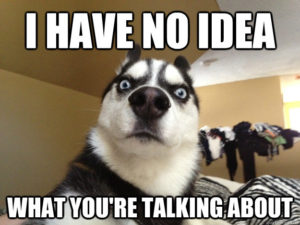Learning a new language is a mind-expanding experience that comes with its ups and downs. In this article, ProLingua Global founder and Head Language Coach Gabriella Ferenczi helps us to take a step back and get a bird’s-eye view of our foreign language learning journey so that we can indentify where we are right now. Stuck in a struggle zone? Read on, as you may pick up a few strategies that will help you get out …
Before we start to work with new clients, we sit down with them and interview them with the help of a complex questionnaire. We have over an hour face-to-face meeting to find out where they are right now, what challenges they face, what they struggle with, why they felt the need to learn a language. The point of these sessions is to work out strategies to fast-track the process of them being able to speak, to understand and to have the confidence to use the language.
The one thing that every single one of these executives feels is that they think their situation is something completely unique.
In many ways, that’s true: They might work in different fields, they might be at a different level, they may have different needs, different learning styles, different schedule and availability, different strengths and weaknesses etc.
But when you start looking at the language learning journey, it is actually far more predictable than you think. There’s certain problems and frustrations that come along at a very predictable time and there’s ways to overcome those.
So, let me walk you through this journey.
I SMILE BECAUSE I HAVE NO IDEA WHAT’S GOING ON …
The first phase of learning a second language is a phase I like to call the ‘Cluelessness’. It’s when you don’t understand a word that’s being said around you, nor are you able to say anything in that particular language. You are essentially clueless.
We’ve all experienced something like this when on holiday, on London’s multiculti streets it’s quite common, and also in business I’ve seen this scenario many many times: Having foreign visitors over from the head office and you not speaking their language, listening to your German colleagues talking to Berlin, Frankfurt, Munich or Zurich and you having no clue what they’re talking about.

You may be constantly surrounded by foreign languages because your company does business abroad, has foreign suppliers that you need to keep contact with, or perhaps you have a foreign spouse or friend that speaks a different language from time to time that you can’t follow.
So it’s kind of natural that, eventually, you start picking up a few words and phrases, you ask colleagues what this means, what that abbreviation stands for, and that’s when you inevitably reach the second phase.
I’M ON MUTE RIGHT NOW …
The second phase of learning a foreign language is what I call ‘Mutism’.
It’s when you start picking up words, you start to understand what’s being said around you, you have a vage idea what’s going on, but you can’t express yourself at all.
This phase can be even more frustrating than Cluelessness, because you know more or less what’s happening around you and would love to add something to the conversation and utter a few words and yet, you can’t.
It’s either this phase or the phase of Cluelessness when most people decide that it’s time to invest into their training and sign up for a training programme that can help them fast-track the learning process. Because let’s admit: It’s frustrating to be clueless and mute.
SAID ‘WHAT?’ THREE TIMES AND STILL HAVE NO IDEA WHAT THE PERSON SAID …
The third phase of learning a second language is what I call the ‘Awkwardness’.
When you reach this phase, you’d have started to actively learn the language, either by yourself through self-study, or with the help of online courses, language schools, tutors or with the help of a language coach.
Now, this phase of Awkwardness is a really complex one. Basically, it’s when you can both understand more and more and also you can finally start to express yourself – even if in a basic way, even if with a limited vocabulary, but you can actually get your point more or less across.
Depending on the level you’re at and the field you use the language in, you’re prone to awkward situations, because your vocabulary is limited, you can’t express yourself appropriately, there might be mistakes in every single sentence.
However, you can get yourself understood and you understand more than before. You’re definitely on the right track.
Awkwardness is inevitable. It’s something you have to accept you’ll go through and not just accept it but also embrace it in order to eventually overcome it and reach the next phase. That requires a right mindset and a huge amount of confidence.
NEVER GET TOO COMFORTABLE …
The fourth phase of learning a second language is what I call ‘Comfort’.
At this stage, you both understand most of what’s being said to you and you can also express yourself. If you go blank and you don’t find the word you’re looking for, you’d have developed strategies to describe those words without breaking down the flow of conversation.
Therefore, at this stage, conversations start to become more complex and natural, and you feel a lot more comfortable. But there’s always room for awkward situations because you mix up two words, you misunderstand something. These situations are usually completely harmless, because you can correct yourself, you can laugh about it and use these funny situations to your advantage: It exposes a side of you that’s perhaps vulnerable, but at the same time, there’s something to admire about it, because you show the effort.
Now, eventually, awkward situations happen on less and less occasions, and you start to feel really relaxed and comfortable in your second language. That’s the Ultimate Comfort phase.
So, that’s the journey we invite you on, nice isn’t it?
Well, it is nice. It’s very rewarding and full of insights, but most of all, it’s a transformational experience.
I believe that no one wants to learn a language. We want to speak it, we want to understand what’s being said to us and around us, and we want to be understood as best as we possibly can.
We also want to have the confidence to actually use the language enough to do business, to build relationships, to make the right impression, to negotiate, to participate constructively in meetings.
I hope that’s helped you to understand the different stages of the language learning journey and that you could pick up a few key ideas that would help you learn whatever language you want to speak more effectively to reach your goal.







0 Comments